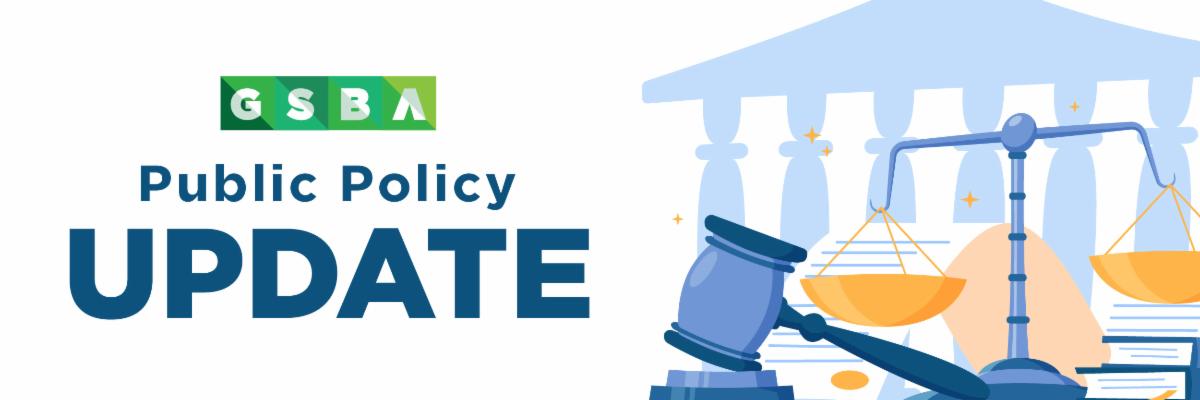GSBA May Advocacy Update: From Budget Shortfalls to Business Rights
The 2024 legislative session closed with a whirlwind of proposals, negotiations, and decisions that will shape the future for Washington’s small businesses—especially LGBTQ+-owned and allied businesses, who often sit at the intersection of economic inequity and entrepreneurial resilience.
From a looming state budget deficit to a sweeping tax package and shifts in federal reporting requirements, GSBA has been tracking these developments to ensure our members stay informed and prepared. Here’s a breakdown of what’s happening and what it means for your business.
Worrying Washington State Budget Outlook
In March, Washington’s Office of Financial Management released updated revenue projections showing nearly $900 million less in expected funds compared to November. This alarming revision signals a potential $15 billion budget shortfall over the next four years.
The dip is largely due to Washington’s reliance on sales tax revenue. During the pandemic, increased consumer spending temporarily boosted collections—but that trend has reversed. Washingtonians are now spending less, and higher interest rates are delaying major purchases like vehicles. As a result, combined collections from sales and B&O taxes are projected to decline by over $450 million in the next budget cycle.
Washington State Budget Negotiations
After extended debate, the Legislature passed a $12 billion state budget, relying on new taxes and budget cuts. Some of the new taxes will directly affect GSBA members—including levies on previously untaxed sectors like website development, IT, advertising, and security.
GSBA has drafted a letter urging Governor Ferguson to veto this portion of the tax package. If vetoed, the Legislature would need to reconvene in a special session to develop an alternative proposal.
Key tax changes include:
Business & Occupation (B&O) Tax Overhaul – HB 2081 / SB 5815 – LINK
- Raises the B&O tax rate across multiple industries, projected to bring in $6 billion over four years.
- Disproportionately impacts small businesses—adding costs during a time when tariffs are already raising the price of goods. This could increase the cost of essentials like food, clothing, and school supplies, and may lead to job losses or closures.
Sales Tax Expansion – SB 5814 – LINK
- Expands sales tax to new industries, including:
- IT consulting, training, and tech support
- Website development and software customization
- Advertising and marketing services
- Security (including monitoring, investigations, armored car services)
- Temporary staffing services
- Requires businesses with $3M+ in taxable retail sales in 2026 to make a one-time sales tax prepayment in June 2027.
- Projected to raise $4.7 billion over four years.
Capital Gains Tax Expansion & Estate Tax Changes – HB 2082 / SB 5813 – LINK
- Maintains 9.9% rate on gains over $1M
- Raises estate tax exemption to $3M
- Expected to raise $1.25 billion over four years
Repeal of Tax Preferences – SB 5794 – LINK
- Eliminates or sunsets several tax exemptions, including:
- B&O deductions on real estate loan interest
- Preferential rates for prescription drug resellers, insurance producers, and credit unions
- B&O credits for international services and banking facilities
- Public utility credits for energy assistance programs
- Exemptions for dental insurance and bullion sales
- Adds new taxes on self-storage rentals and nicotine products
- Projected to raise $604 million from 2027–2029

Corner Store Crawl
GSBA is actively engaged in Seattle’s Comprehensive Plan conversations. We’ve joined a coalition to advocate for zoning that supports neighborhood corner stores—small businesses that bring life, convenience, and connection to every city district.
To build awareness, we’re hosting events at corner stores across Seattle. Stay tuned to learn more and find one near you.

Tariffs Continue to Impact Local Business
Far-reaching tariffs imposed by the Trump administration have raised concerns among our state’s business leaders. The Washington State Department of Commerce has launched an online tariff information and resource guide in response to questions and confusion around recently implemented federal tariffs. The new resource includes export-related support from across communities and at the state and federal levels.
For more information:
- Learn more about WA tariffs on the Association of Washington Business website, and take the Tariff Impact Survey here.
- Check out Washington Council on International Trade’s Trade Dashboard.
- Visit the Global Business Alliance Tarriff Tracker.
- Bloomberg is maintaining a tariff tracker, by country.
Background:
- On March 4, Trump put a 25% tariff on imported goods from Canada and Mexico and an additional 10% tariff on goods from China (which he later doubled to 20% and then delayed portions of).
- In response, DelBene and other top House Democrats introduced resolutions to terminate President Trump’s illegal use of “emergency” authorities that he used to impose the tariffs. The resolutions would have forced a vote that would make clear if lawmakers support Trump’s “emergency” tariffs on Canada and Mexico.
- On March 11, House Republicans snuck a provision in a procedural measure that avoided that vote.
- DelBene previously introduced the Prevent Tariff Abuse Act, the Congressional Trade Authority Act, the Repealing Outdated and Unilateral Tariff Authorities Act, and the Reclaim Trade Powers Act to rein in Trump’s abuses of tariff powers under IEEPA, Section 232 of the Trade Expansion Act of 1962, Section 338 of the Tariff Act of 1930, and Section 122 of the Trade Act of 1974, respectively.
- On April 2, Trump put in place sweeping tariffs on nearly every country.
- On April 8, DelBene and other top Democrats introduced a resolution to force a vote on Trump’s April 2 tariffs.
- On April 10, Ways and Means Trade Subcommittee Member Suzan DelBene (WA-01), Ranking Member Richard Neal (MA-01), Trade Subcommittee Ranking Member Linda Sánchez (CA-38), along with all Ways and Means Committee Democrats introduced the Stopping a Rogue President on Trade Act, a bill to end the constant chaos created by President Trump’s trade wars and reclaim Congress’ authority over tariffs.
Beneficial Ownership Information Report (BOIR) Now Optional
On March 2, the United States Department of the Treasury announced the suspension of the BOIR requirement. This means that LLCs are no longer required to file this report and will not be fined if they fail to do so. If you have already filed, this is now considered an optional report.

Know Your Rights Community Forum
Join the Seattle Domestic Work Standards Board and the Labor Standards Advisory Commission for a “Know Your Rights” training for small businesses and workers.
This forum provides a space to raise questions, share concerns, and learn more about workplace rights and responsibilities in Seattle.
Event Details:
🗓 Monday, June 16 | ⏰ 6–8 PM
📍 5030 1st Ave S, Seattle, WA 98134
Special thanks to GSBA Member Amanda Powter (Perfect Copy & Prints), Board Member Samuel Hilbert (Aluel Cellars), and GSBA President & CEO Ilona Lohrey for serving on the Seattle Labor Standards Advisory Committee and helping make this event possible.
Policy Counsel and Government Relations Manager, GSBA




